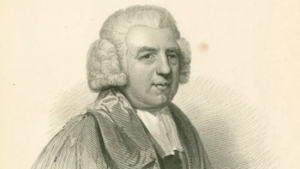
John Newton
*John Newton was born on this date in 1725. He was a white-English slave trader and Anglican clergyman.
John Newton was born in Wapping, London, the son of John Newton, the Elder, a shipmaster in the Mediterranean service, and Elizabeth (née Scatliff). Elizabeth was the only daughter of Simon Scatliff, an instrument maker from London. She died of tuberculosis in July 1732, about two weeks before his seventh birthday. Newton spent two years at a boarding school before going to the home of his father's new wife. At age eleven, he first went to sea with his father.
Newton sailed six voyages before his father retired in 1742. At that time, Newton signed on with a merchant ship sailing to the Mediterranean Sea. In 1743, Newton was captured and pressed into the naval service by the Royal Navy. At one point, Newton tried to desert and was punished in front of the crew, stripped to the waist, and tied to the grating; he received a flogging of eight dozen lashes and was reduced to the rank of a common seaman. He recovered, both physically and mentally. Later, he transferred to Pegasus, a slave ship bound for West Africa.
The ship carried goods to Africa and traded them for slaves to be shipped as part of the Middle Passage in the Caribbean and North America. Newton did not get along with the crew of Pegasus. In 1745, they left him in West Africa with Amos Clowe, a slave dealer. Clowe gave him to his wife, Princess Peye of Sierra Leone, who abused and mistreated Newton just as much as she did her other slaves. Early in 1748, he was rescued by a sea captain sent by Newton's father to search for him. He returned to England on the merchant ship Greyhound.
In 1748, during his return voyage to England aboard the ship Greyhound, Newton had a spiritual conversion. He awoke to find the ship caught in a severe storm off the coast of Donegal, Ireland, and about to sink. In response, Newton began praying for God's mercy, after which the storm died. After four weeks at sea, the Greyhound reached port in Lough Swilly, Ireland. This experience marked the beginning of his conversion to Christianity. He began to read the Bible and other religious literature. By the time he reached Britain, he had accepted the doctrines of evangelical Christianity.
The date was March 10, 1748, an anniversary he marked for the rest of his life. From that point on, he avoided profanity, gambling, and drinking. Although he continued to work in the slave trade, he gained sympathy for the slaves during his time in Africa. He later said that his true conversion did not happen until later: "I cannot consider myself to have been a believer in the full sense of the word until a considerable time afterward." Newton returned in 1748 to Liverpool, a major port for the Triangle Trade. Partly due to the influence of his father's friend Joseph Manesty, he obtained a position as the first mate aboard the slave ship Brownlow, bound for the West Indies via the coast of Guinea.
Newton continued to work in the slave trade. After his return to England in 1750, he made voyages as captain of the slave ships Duke of Argyle and African. After suffering a severe stroke in 1754, he gave up seafaring while continuing to invest in Manesty's slaving operations. In 1780, Newton moved to the City of London as rector of St Mary Woolnoth Church, where he contributed to the work of the Committee for the Abolition of the Slave Trade, which was formed in 1787. During this time, he wrote Thoughts Upon the African Slave Trade. In it, he states, "So much light has been thrown upon the subject, by many able pens; and so many respectable persons have already engaged to use their utmost influence, for the suppression of a traffic, which contradicts the feelings of humanity; that it is hoped, this stain of our National character will soon be wiped out."
In 1788, 34 years after he had retired from the slave trade, Newton broke a long silence on the subject by publishing a forceful pamphlet, Thoughts Upon the Slave Trade, in which he described the horrific conditions of the slave ships during the Middle Passage. He apologized for "a confession, which ... comes too late ... It will always be a subject of humiliating reflection to me, that I was once an active instrument in a business at which my heart now shudders." He had copies sent to every MP, and the pamphlet sold so well that it swiftly required reprinting.
Newton became an ally of William Wilberforce, leader of the Parliamentary campaign to abolish the African slave trade. Newton came to believe that during the first five of his nine years as a slave trader, he had not been a Christian in the full sense of the term. In 1763, he wrote: "I was greatly deficient in many respects ... I cannot consider myself to have been a believer in the full sense of the word, until a considerable time afterward." In 1767, William Cowper, the poet, moved to Olney. He worshipped in Newton's church and collaborated with the priest on a volume of hymns published as Olney Hymns in 1779.
This work had a great influence on English hymnology. The volume included Newton's well-known hymns: "Glorious Things of Thee Are Spoken," "How Sweet the Name of Jesus Sounds!" "Let Us Love, and Sing, and Wonder," "Come, My Soul, Thy Suit Prepare," "Approach, My Soul, the Mercy-seat" and "Faith's Review and Expectation," which has come to be known by its opening phrase, "Amazing Grace." Newton lived to see the British Empire’s abolition of the African slave trade in 1807, just months before his death on December 21, 1807.